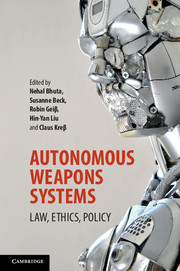Book contents
- Frontmatter
- Contents
- List of contributors
- Acknowledgements
- PART I Introduction
- PART II Meanings of autonomy and human cognition under automation
- PART III Autonomous weapons systems and human dignity
- PART IV Risk, transparency and legal compliance in the regulation of autonomous weapons systems
- PART V New frameworks for collective responsibility
- PART VI New frameworks for individual responsibility
- 13 Autonomous weapons systems: new frameworks for individual responsibility
- 14 Refining responsibility: differentiating two types of responsibility issues raised by autonomous weapons systems
- PART VII Conclusion
- Index
14 - Refining responsibility: differentiating two types of responsibility issues raised by autonomous weapons systems
from PART VI - New frameworks for individual responsibility
Published online by Cambridge University Press: 05 August 2016
- Frontmatter
- Contents
- List of contributors
- Acknowledgements
- PART I Introduction
- PART II Meanings of autonomy and human cognition under automation
- PART III Autonomous weapons systems and human dignity
- PART IV Risk, transparency and legal compliance in the regulation of autonomous weapons systems
- PART V New frameworks for collective responsibility
- PART VI New frameworks for individual responsibility
- 13 Autonomous weapons systems: new frameworks for individual responsibility
- 14 Refining responsibility: differentiating two types of responsibility issues raised by autonomous weapons systems
- PART VII Conclusion
- Index
Summary
Introduction
The prospect of autonomous weapons systems (AWS) has raised persistent questions of responsibility and accountability, the contours and content of which remain ill defined. This chapter seeks to clarify these questions by differentiating between two distinct, yet converging, categories of responsibility issues. The first category of responsibility issues is created by the autonomy of the weapons systems itself and arises from the circumstances in which they are used (a ‘circumstantial responsibility problem’). The second set of issues is only exposed by AWS because it is conceptual in nature, arising from the relationships between different conceptions of responsibility (a ‘conceptual responsibility problem’). Drawing this basic differentiation is critical because it suggests the existence of two independent problems that both require a solution, whereas only the former has been addressed in the literature to date.
As identified, the core of the problem is that the would-be direct perpetrators, who would ordinarily be individually responsible for unlawful behaviour, will be replaced by autonomous entities that are incapable of bearing direct responsibility for such consequences at the outset. There are two basic avenues to solve this circumstantial responsibility problem: either meaningfully ascribe responsibility to the autonomous entities themselves or impute responsibility to proximate human beings. Neither avenue, however, is entirely satisfactory. On the one hand, assigning responsibility to artificial agents is unsatisfying and seems to entail impunity. On the other hand, imputing responsibility to proximate individuals raises a risk of scapegoating the individuals associated with these operations. These inadequacies suggest that alterations in legal doctrine are necessary to accommodate the prospect of AWS.
I also argue, however that resolving the circumstantial responsibility problem issues surrounding autonomous weapons usage is necessary, but insufficient, because a distinct set of conceptual responsibility issues would still remain. This set of responsibility issues is inherent within the disparate, but interrelated, ideas that together inform the concept of responsibility and that occur where causal forms of responsibility are conflated or substituted with types of role responsibility. Unlike circumstantial responsibility issues, which are created by the autonomy of the weapons system breaking the chain of causality, I suggest that conceptual responsibility issues are merely revealed by the challenges of artificial autonomy and remain unchanged with alterations in practice.
Information
- Type
- Chapter
- Information
- Autonomous Weapons SystemsLaw, Ethics, Policy, pp. 325 - 344Publisher: Cambridge University PressPrint publication year: 2016
Accessibility standard: Unknown
Why this information is here
This section outlines the accessibility features of this content - including support for screen readers, full keyboard navigation and high-contrast display options. This may not be relevant for you.Accessibility Information
- 7
- Cited by
